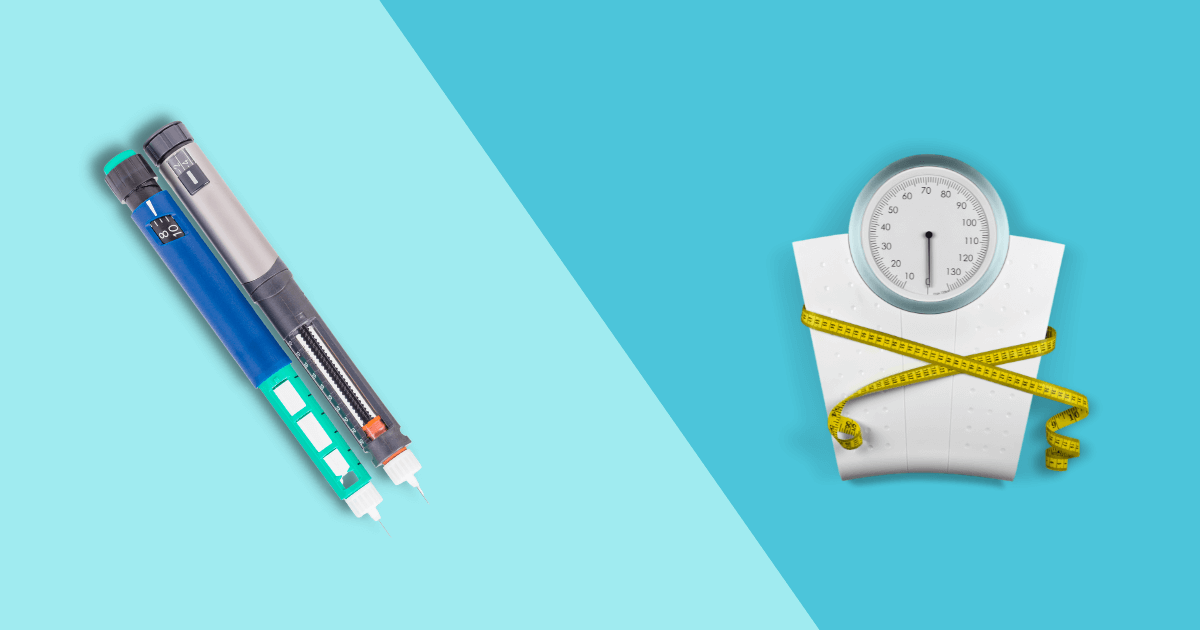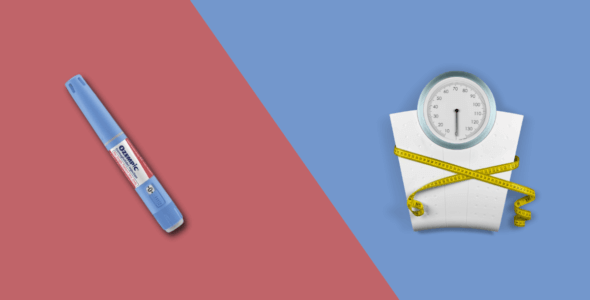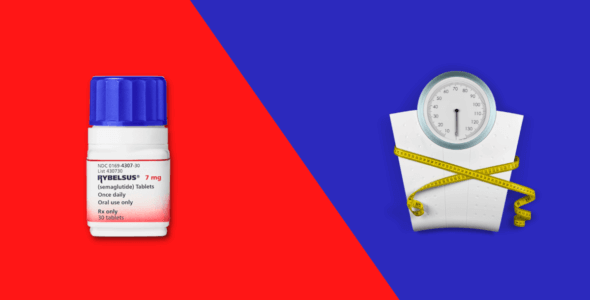GLP-1 medications: do they work for weight loss?
Table of contents
Obesity, a chronic disease within the adult population in the United States, has increased to almost 42% of the population. The highest rates of almost 50% are found in non-Hispanic Black adults and around 46% in Hispanic adults. People with obesity have been shown to be at an increased risk of other serious weight-related comorbidities such as certain types of cancer, heart disease, strokes, hypertension (high blood pressure), metabolic disorders, and an increased risk of developing diabetes. Obesity has also been seen to affect the quality of life and negatively impact mental health.
Certain type 2 diabetes medications have been shown to help improve blood sugar control and cause weight loss. This class of weight loss medications is called glucagon-like peptide 1 receptor agonists (GLP-1). Wegovy (semaglutide) and Saxenda are (liraglutide) the only two brand-name GLP-1 receptor agonists, both manufactured by Novo Nordisk that are FDA-approved (Food and Drug Administration) for weight management in the U.S.
Here we will look at these GLP-1 drugs in more detail and answer some of the more commonly asked questions.
Do GLP-1 drugs work for weight loss?
GLP-1 incretin hormones help lower your blood glucose levels when you digest food in three ways. They:
- Stimulate your body to produce more insulin to help lower blood sugar levels
- Prevent the release of glucagon
- Slow down how quickly food from the stomach moves into the small intestine, causing you to feel fuller for longer and to eat less
GLP_1 drugs are more active when you have eaten and are less active when you stop. This helps to prevent blood glucose levels from falling too low and causing hypoglycemia. GLP-1s have added benefits in that they also reduce the risk of heart diseases, such as heart failure and stroke, and improve blood pressure and cholesterol levels.
What are the GLP-1 medications?
Medications for diabetes and insulin help to reduce blood sugars but may also cause weight gain. All GLP-1 drugs can cause weight loss. However, not all are FDA-approved for weight loss, specifically in the U.S. GLP-1 medications include:
- Trulicity (dulaglutide) – used in combination with diet and exercise to treat type 2 diabetes in adults
- Saxenda (liraglutide) – FDA-approved for weight management in the U.S. and can lead to a weight loss of between 10 to 16 pounds
- Victoza (liraglutide) – FDA-approved for use with a healthy diet and exercise to lower blood sugar levels in patients 10 years of age and older with type 2 diabetes. It is also used to reduce heart attacks and stroke in type 2 diabetic patients with heart disease
- Ozempic (semaglutide) – used with diet and exercise in adults to treat type 2 diabetes
- Rybelsus (semaglutide) – used with diet and exercise to lower blood sugar levels in adults with type 2 diabetes mellitus
- Wegovy (semaglutide) – FDA-approved (Food and Drug Administration) for weight management in the U.S.
- Bydureon Bcise (exenatide) – used to help control blood sugar levels in patients with type 2 diabetes
- Tanzeum (albiglutide) – used in combination with diet and exercise to improve glycemic control in adults with type 2 diabetes mellitus
- Byetta (exenatide) – also used in combination with diet and exercise to improve glycemic control in adults with type 2 diabetes mellitus
- Mounjaro (tirzepatide) a once-weekly glucose-dependent insulinotropic polypeptide (GIP) and GLP-1 receptor agonist, the only FDA-approved dual-action GIP and GLP-1 receptor agonist for the treatment of diabetes
- Compounded Semaglutide
- Compounded Tirzepatide
Which GLP-1 works best for weight loss?
In clinical trials, liraglutide was compared with semaglutide in adult patients without diabetes with a body mass index (BMI) of 30 or more.
It was found that liraglutide 3.0 mg daily caused a mean weight loss of around 8% at week 52 of the trial, while semaglutide 0.2 mg, 0.3 mg, and 0.4 mg caused an average weight reduction of between 11 to 14%. The average weight loss in the trial was slightly above 2% in the placebo group.
The weight loss seen when using semaglutide is greater than when using other classes of antiobesity medications:
- Orlistat (6%)
- Lorcaserin (6%)
- Phentermine-topiramate (8%-10%)
- Naltrexone-bupropion (5%)
5% to 10% of initial weight is defined as significant weight loss. This is the point at which an improvement in risk factors for cardiovascular disease is seen.
Once-weekly use of semaglutide also helps to improve compliance and quality of life, compared to once-daily administration. This has been seen when using GLP-1 agonists for the management of weight loss as well as for other long-term diseases.
What is the recommended dosage of GLP-1 for weight loss?
Liraglutide was originally approved by the FDA in 2015 as the first GLP-1 agonist for chronic weight management in obese or overweight adults. This was subsequently updated in Dec 2020 to include liraglutide for the treatment of obesity in adolescents between 12 to 17 years of age
The starting dose of liraglutide is 0.6 mg once each day for 1 week and increased weekly to a maintenance dose of 3 mg once each day. Liraglutide is administered as a subcutaneous injection daily. It is long-acting with a half-life (the time it takes for half of the active drug to be eliminated from your body) of between 12 to 15 hours.
Wegovy (once-weekly semaglutide) was FDA-approved in June 2021 for chronic weight management in obese or overweight adults. The initial starting dose of semaglutide is 0.25 mg once weekly, also administered as a subcutaneous injection. The dose of semaglutide is increased every 4 weeks to a maintenance dose of 2.4 mg.12 Semaglutide has a half-life of around 1 week, which means it may be administered once a week.
You are advised to read the prescribing information provided with your medication for the complete drug information.
How long does it take to lose weight on GLP-1?
GLP-1s are most effective for weight loss when used in combination with lifestyle changes such as changes to diet, an increase in physical activity, improved sleep quality, and emotional health.
Those following these lifestyle interventions while using GLP-1 medications will lose at least 5% of their body weight within 3 months and a reduction in body fat percentage. At 6 months, patients may lose at least 10% of body weight.
What are the side effects of GLP-1?
GLP-1 drugs are generally administered as an injection, and side effects may occur. The more common side effects you experience with GLP-1 drugs will often improve as you use the treatment. Some of the more common side effects in clinical trials compared to placebo include:
- Gastrointestinal side effects such as nausea, vomiting, constipation, or diarrhea
- Abdominal pain
- Headache, dizziness
- Fatigue
- Dyspepsia, abdominal distension, eructation
- Hypoglycemia (low blood sugar) in patients with type 2 diabetes
- Flatulence, gastroenteritis, and gastroesophageal reflux disease (heartburn)
Hypoglycemia (low blood sugar levels), a more serious side effect of GLP-1 drugs, may also occur. The risk of this increases if you also take other drugs known to reduce blood sugar levels at the same time, such as insulin or sulfonylureas.
While the majority of patients take these medications without any serious complications, they do carry a black box warning concerning the possible increased risk of medullary thyroid carcinoma. This comes from animal studies and was not replicated during placebo-controlled clinical trials. In rare instances, GLP-1 drugs can cause more serious side effects. These can include:
- Acute pancreatitis
- Acute gallbladder disease
- Acute kidney injury – monitor renal function when initiating or escalating doses if severe adverse gastrointestinal reactions occur
- Hypersensitivity
- Diabetic retinopathy complications in patients with type 2 diabetes
- Heart rate increase
- Suicidal behavior and ideation
Your doctor will assess the benefits of using GLP-1 medications against your risk of adverse effects. You are encouraged to report adverse events or adverse reactions to GLP-1 drugs to the FDA. Visit www.fda.gov/medwatch, or call 1-800-FDA-1088.
GLP-1 FAQs
Can I take Ozempic for weight loss if I’m not diabetic?
No. Ozempic is currently only FDA-approved for the treatment of type 2 diabetes mellitus to help improve the control of blood sugar levels and to reduce the risk of cardiovascular problems in patients with Type 2 diabetes and cardiovascular disease.
RELATED: Ozempic for weight loss
Can you drink alcohol while on GLP-1?
In more recent years, alcohol-related behavior has been linked to gut-brain peptides, which are known to control appetite and food intake. These gut-brain peptides include peptide glucagon-like peptide-1 (GLP-1). Interestingly, it has been shown in trials that GLP-1 inhibitors increase alcohol consumption, and GLP-1 receptor agonists reduce alcohol consumption in patients with type-2 diabetes mellitus. These studies raise the question that GLP-1 receptor agonists need to be tested further as potential treatments for those with alcohol addiction as well as other addictive disorders.
The general advice currently, however, is to avoid drinking alcohol while using GLP-1 treatments, as drinking alcohol increases the risk of side effects such as hypoglycemia. This may not always be a realistic target, and as such, you are advised to discuss your alcohol consumption with your healthcare provider if you are using GLP-1 medications.
What naturally increases GLP-1?
Glucagon-like peptide-1 is a gastrointestinal hormone released by L cells in the body in direct response to food intake, with the release of GLP-1 in the body being mainly stimulated by glucose and fatty acids. Excessive intake of sugar and fat can cause the development of obesity and diabetes.
Food factors that release GLP-1, such as dietary peptides and non-nutrients, are seen as desirable to improve glucose tolerance. Studies in humans and animals have shown that proteins/peptides in the diet will help to stimulate the secretion of GLP-1 and that dietary amino acids, peptides, and phytochemicals (quercetin), can all stimulate GLP-1 secretion.
These food factors improve the breakdown of glucose and increase the secretion of GLP-1. Some of these dietary peptides also reduce the activity of plasma peptidase, which inactivates GLP-1. Using food factors that will help to release or stimulate GLP-1 activity may potentially be a way to prevent and treat obesity and diabetes.
Can non-diabetics take GLP-1?
The US Food and Drug Administration has currently approved 6 drugs for the long-term treatment of obesity in the U.S. These include lorcaserin, naltrexone/bupropion, phentermine/topiramate, orlistat, and the glucagon-like peptide-1 analogues liraglutide, and semaglutide.
GLP-1 agonists increase insulin secretion and block the release of glucagon only when glucose levels increase in the body and can be used in non-diabetic patients suffering from obesity without causing low blood sugar levels.
Liraglutide and semaglutide are approved in combination with a reduced-calorie diet and increased physical activity for chronic weight management under the brand names Saxenda and Wegovy.
Who should not take GLP-1?
GLP-1 drugs are not recommended if you are allergic to the active ingredients semaglutide or liraglutide if anyone in your family has had a type of thyroid cancer called medullary thyroid carcinoma (MTC), if you have an endocrine system condition called multiple endocrine neoplasia syndrome type 2 (MEN 2), if you have pancreatitis, type 1 diabetes, or are under 18 years of age.
Do you have to take GLP-1 forever?
GLP-1 are intended for long-term use, and it is important you take them for as long as your doctor advises you to do so. Do not stop using this medication without medical advice, and discuss any side effects you may experience with your healthcare provider when taking this treatment.
Is GLP-1 an appetite suppressant?
GLP-1 is not an appetite suppressant as such. GLP-1 treatments delay gastric emptying and promote the feeling of fullness and satiety and therefore reduce food intake, appetite and food cravings. These combinations of effects lead to weight loss through a reduction in food consumption and energy intake.
Is GLP-1 the same as insulin?
Unlike other treatments for type 2 diabetes, Ozempic (semaglutide) and Victoza (liraglutide) are not types of insulin. They are human hormones that act on different parts of your body. Semaglutide and liraglutide encourage your pancreas to produce more insulin, helping to lower your blood sugar after you’ve eaten. They also appear to increase the growth of the cells in your pancreas that produce insulin (beta-cells).
Can you take GLP-1 receptor agonists while you are pregnant or breastfeeding?
Animal reproduction studies have shown there may be potential risks to the fetus if these medications are used during pregnancy. You should stop taking these drugs as soon as you find out you’re pregnant or at least 2 months before a planned pregnancy.
It is not known if these medications are found in breast milk. You should discuss the risks of using these medications during lactation with your healthcare provider.
Is the GLP-1 injection painful?
GLP-1 injections may be painful. To help prevent this, the injections are given in parts of the body containing fewer pain receptors. This would normally be areas such as the upper arm, thigh, or abdomen. You are also advised to rotate injection sites and not to inject in the same area of skin each time. This will help to prevent side effects such as lipohypertrophy (skin thickening under the skin).
Do you need a prescription for GLP-1?
Yes. Talk to your healthcare provider about your diabetes care options and if you need a GLP-1 prescription. Diabetes and obesity are challenging, long-term medical conditions, and you will need professional support and advice from your healthcare provider.
What is the difference between Victoza and other GLP-1s?
The main points to remember are that Victoza is used as an adjunct to improved diet and exercise to help manage high blood sugar levels in people aged 10 years of age and older with type 2 diabetes and also to reduce the risk of certain heart problems in adults with type 2 diabetes and heart disease. Victoza is not FDA-approved as a weight loss drug. Also, Victoza is administered subcutaneously once daily and not once weekly.
What is the difference between Victoza and Ozempic?
Both Ozempic and Victoza are given as subcutaneous injections under your skin. The main difference between the two is how often you use them. Ozempic is injected once weekly, while Victoza is injected once daily.
Ozempic is considered better than Victoza at reducing HbA1C and weight. However, Ozempic also causes more stomach-related side effects than Victoza.
RELATED: Ozempic vs Victoza
Medically reviewed
A medical professional has reviewed this article.


Jamie Winn, PharmD
Jamie Winn, PharmD
Dr. Jamie Winn received his Doctor of Pharmacy in 2002 from the University of South Carolina College of Pharmacy, Columbia, SC. Jamie is a medical reviewer for NiceRx.








